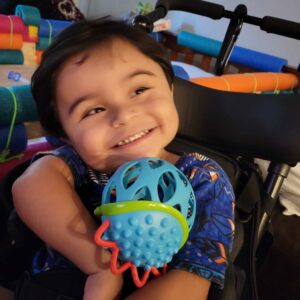
Rare Community Profiles is a Patient Worthy article series of long-form interviews featuring various stakeholders in the rare disease community, such as patients, their families, advocates, scientists, and more.
Blazing a Trail into Unknown Territory: How Two Parents Are Working to Change the Narrative Around CASK Gene Disorder
Three-year-old Anthony Storella Levinsky has a bright and heart-warming smile—and he’s rarely without it. He grins when he plays with Samson, his one-year-old puppy; has an infectious belly laugh that comes out whenever he’s around his grandparents and parents; and listens with abandon to Shakira, Selena Quintinilla’s music, and his favorite Disney movies: Aladdin, The Little Mermaid, Moana, and Princess and the Frog. Says Terry Storella and Isaac Levinsky, Anthony’s parents:
“Anthony is the kindest, sweetest, most caring little boy with the most adorable dimples and smile. He is a joy to be around and makes others around him happier. Anthony loves when we sing to him, and we’ve made special songs for different activities. He has a great imagination and is our little engineer. Whatever we’re doing, he is trying to figure out how things work. Anthony loves to play and loves to cuddle. He is truly the light of our lives.”

When Anthony was diagnosed with CASK gene disorder just a few months before his second birth, Isaac and Terry had no idea what their son’s life would look like. There was little available information. Doctors had no resources or options to offer the family. Even top geneticists couldn’t tell Terry and Isaac what to expect for Anthony in the future.
Dealing with a rare disease can be frightening, isolating, and sometimes overwhelming. But for Terry and Isaac, they find hope and joy every time they see their son’s face. Despite the obstacles he has faced in his three years on earth so far, Anthony is not just a source of constant joy, but a portrait of strength. He has been through innumerable tests, blood draws, and hospital stays, but never lets it affect his happiness. His gentleness, kindness, and bravery seem unmatched.

Terry and Isaac have not just remained resilient, but rewritten the narrative on what it means to have a child with a rare condition. As Terry explains:
“I think that people may assume that there are certain feelings we hold, especially as we look for ways to help Anthony. People who don’t know Anthony are often nervous around him and he can sense that. To understand our family, it is best to understand CASK and how it affects Anthony. But don’t treat him differently. Anthony likes to be spoken to directly and treated like other children. I want to be clear: Anthony is the light of our life and the center of our world. He is perfect the way that he is. We are blessed to have Anthony as our son.”
Recently, Terry spoke with Patient Worthy about CASK gene disorder and how it affects Anthony, her reasons for raising awareness, and why rare disease families need support now more than ever.
Looking for a Zebra
Anthony came into the world earlier than expected. His premature birth necessitated a nine-day stay in the NICU. During his stay, doctors noticed that Anthony showed signs of feeding difficulties and digestive problems. Despite these challenges, Anthony developed fairly normally over the first three months of his life. It wasn’t until later that Terry’s concerns began to mount. His digestive issues remained; Anthony was often constipated and had reflux. His stomach seemed to empty slowly. More worryingly, his developmental progress slowed. Between six and nine months old, Anthony had severe developmental regression.
By the time Anthony was four months old and until he was nine months old, Terry and Isaac were searching desperately for a doctor to listen to their increasingly alarming concerns about their son. Says Terry:
“We were there every week telling them something was wrong. It felt like the journey to the moon for the first astronauts: blazing a trail into unknown territory. Doctors are trained to look for common problems. If a doctor hears hoof-beats, he thinks of horses, not zebras. We were looking for a zebra.”
Finally, doctors referred Anthony to a neurologist at Johns Hopkins All Children’s Hospital. An extensive workup showed that Anthony has leukodystrophy. Since leukodystrophy failed to explain Anthony’s symptoms, more testing was needed: geneticists, specialists. Terry shares:
“We had to spend day and night researching, writing to doctors, making phone calls, spending countless hours dealing with insurance, and pleading our case for our son. It was a relentless effort that seemed to have no end. We sought out the best hospitals in Florida and across the country to figure out what was going on and what we could do about it. We knew that Anthony had something rare, and nobody believed us until the very end when everything else had been ruled out.”
After a year and a half of searching, whole exome sequencing provided an answer. Anthony had CASK gene disorder.

What is CASK Gene Disorder?
Also known as: CASK-related disorder(s)
As Terry explains:
“CASK gene disorder results from a genetic mutation in the CASK protein. CASK stands for calcium/calmodulin-dependent serine protein kinase. It is a disorder that affects the way the brain forms, the way neurons (brain cells) communicate with each other, the release of neurotransmitters, and other things that researchers are still uncovering. Basically, the signals between brain cells and brain regions are affected, andalso between the brain and body parts they are supposed to reach. This disorder causes many challenges.”
The CASK Gene Foundation also shares that there are currently two known subtypes of CASK-related disorders: MICPCH (microcephaly with pontine and cerebellar hypoplasia) and XL-ID (X-linked intellectual disability) with or without nystagmus.
Currently, there is a significant unmet need for research into CASK-related disorders. This research could be crucial in developing targeted therapies, improving diagnostic tools, and enhancing an understanding of the underlying mechanisms involved in these disorders. Ultimately, this could also lead to better treatment outcomes and improved quality-of-life. Further, more education and awareness can contribute to better, more inclusive, and more equitable treatment. Terry shares:
“Nurses, social workers, doctors, and therapists sometimes assume that another disease approach applies to CASK or they know something without asking us or researching. For example, Anthony cannot have anesthesia. Most medical people forget that or don’t ask about it. We always have to inform Anthony’s doctors about what CASK is and how it affects him. We are the source of all information for Anthony and the only ones who understand what he is thinking and feeling. The medical community relies on us since Anthony is nonverbal and unable to tell them himself. Additional research, and caregiver support, could significantly benefit families.”
How CASK Manifests
From what we understand about CASK so far, we recognize how the disorders sometimes manifest, as well as who they affect. Male infants are thought to have more severe symptoms than female infants, most likely due to the X-linked inheritance. CASK may present with microcephaly (a smaller head size), seizures, developmental delays, hip dysplasia, scoliosis, altered muscle tone, swallowing or feeding challenges, reflux and constipation, hearing and vision loss, sleep disturbances, temperature regulation issues, and reduced response to painful stimuli.
In Anthony’s case, Terry explains that Anthony deals with a number of different symptoms. These include:
Hypotonia (low muscle tone). This makes it more difficult for Anthony to sit, crawl, stand, or walk. After meals, he must sit up for 30-45 minutes before he can lay back down to help with digestion and muscle function. Anthony also fatigues easily. Says Terry:
“Because of this, Anthony spends much of the day in his special bed that his father made him. It has padded walls,straps that he can hold onto, and toys. We play with him in his bed because it keeps him comfortable.”

Digestive difficulties. Anthony has severe hypomotility of his intestines, as well as inconsistent and slow stomach emptying; he has been diagnosed with gastroparesis. He also deals with nausea, vomiting, and severe constipation. To manage his digestive issues, Terry and Isaac implemented a strict feeding schedule. They explain:
“Anthony is still bottle-fed. We feed him on a 24-hour schedule, much like a newborn baby. Each day, we place him in a bed downstairs while we prepare his oral medicines. Anthony cannot swallow pills, so he takes his medicine by oral syringe. He gets his morning medicines once in his wheelchair. After he digests that, we can give him a bottle. We have to allowtime for his stomach to empty.”
Macrocephaly. While microcephaly (an abnormally small head size) is more common in children with CASK, some children develop macrocephaly, or a larger-than-average head size. Anthony is in this group.
Additionally, Anthony has cortical blindness, nystagmus, obstructive sleep apnea, speech apraxia, development delays, difficulty regulating body temperature, and seizures. His doctors have also cautioned that any further development regression—which can be caused by getting sick with something as small as a cold or the flu—could be life-threatening. As such, says Terry:
“We provide 24-hour caregiving to Anthony. If anybody comes into contact with him, they must wear an N95 mask.”
Becoming an Advocate
When Terry reflects on the start of her family’s journey into rare disease, she recalls how challenging it was to get anybody to listen. The doctors had no time and offered even less support. In part, this experience spurred her into advocacy:
“We have to constantly remind doctors that Anthony is different, and advocate for him and his needs. Advocating is a special skill.”
Part of her advocacy involves sharing Anthony’s story and connecting with other CASK families. After all, there is power in community. Terry shares:
“We’ve joined the Facebook community for parents whose children have CASK. We also received great support from the Florida School for the Deaf and Blind, Lighthouse for the Blind, and the Hospital Homebound Program. If your child has CASK, you’re not alone. Reach out to other people who understand.”
Terry’s advocacy also took a more tangible approach during Rare Across America, which her family participated in during the summer of 2023. During Rare Across America, Terry spoke with her state representatives, senators, and other officials about the need for rare disease awareness and support. In sharing her story, she also found connection, noting:
“We have been greatly helped by Senator Marco Rubio, Representative Kevin Steele, Governor DeSantis, and their teams. Senator Christopher Murphy in Connecticut was also helpful when we needed to travel to take Anthony to see Dr. Jiang at Yale University. We are grateful for everybody on this journey who has been in our corner to support our goal: finding ways to help Anthony and the other children affected by CASK.”
To further this sense of connection, Terry and her husband are working to set up a foundation for CASK- related disorders. Her goal is not just to raise broader awareness and to educate others about CASK, but to provide tangible insight and support to this community. All documents have been filed and more information on the foundation will be available in the future. If you are a family impacted by CASK and would like to connect with Terry to learn more, please email [email protected] and she’d be happy to facilitate the connection.
Finally, Terry has been working to push for the development of gene therapy solutions to potentially cure CASK-related disorders. At the end of 2023, the family learned that Anthony could potentially be a candidate for CRISPR gene therapy. A GoFundMe is set up to advance the research into this gene therapy and support the family through any additional medical expenses. But at the end of the day, Terry says:
“Families who have rare conditions need your support financially, but also personally. They fight a battle every day. Just say hello and talk to them. We love to hear from you and hear your supportive words for warriors like Anthony.”



